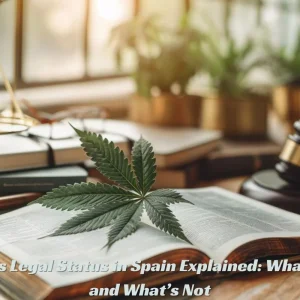Barcelona, with its sun-soaked streets and vibrant cultural scene, has gained global recognition for something a bit unconventional: its cannabis culture. As more travelers and locals alike engage with this facet of the city, a pressing question arises—is marijuana legal in Barcelona? Understanding the legal landscape, the role of cannabis clubs, and the broader implications of this culture is key to navigating Barcelona’s unique cannabis scene.
The Legal Status of Cannabis in Spain
To understand is marijuana legal in Barcelona, it’s essential to first grasp the broader legal framework in Spain. In Spain, cannabis is decriminalized for personal use, meaning that possessing and consuming small amounts of cannabis for personal use is not considered a criminal offense. However, it’s important to note that this decriminalization applies strictly to private spaces. Consuming or possessing cannabis in public can lead to hefty fines.
The cultivation of cannabis is also legal under certain conditions. Spanish law allows individuals to grow a limited number of plants for personal use, but only in private spaces. This legal grey area has given rise to Barcelona’s cannabis clubs, which have become central to the city’s cannabis culture.
What Are Cannabis Clubs?
Cannabis clubs in Barcelona operate within a unique legal loophole. These private, members-only clubs allow individuals to consume cannabis in a controlled environment. While the legality of these clubs remains somewhat ambiguous, they operate under the premise that they are private organizations where members collectively cultivate and consume cannabis for personal use.
Jordi Rius, President of the Catalan Federation of Cannabis Associations (FACS), offers valuable insight: “Barcelona has become a global reference point for cannabis culture, demonstrating that a regulated approach can be successful. Our cannabis clubs have proven to be a viable model for responsible consumption and cultivation” Catalan Federation of Cannabis Associations.
The Role of Cannabis Clubs in Harm Reduction
One of the most significant contributions of Barcelona’s cannabis clubs is their role in promoting harm reduction. Unlike the black market, where cannabis quality is often dubious, cannabis clubs provide a safe and controlled environment for consumption. These clubs typically implement strict quality control measures to ensure that the cannabis provided to members is safe and free from harmful substances.
Oscar Parés, Deputy Director of the International Center for Ethnobotanical Education, Research, and Service, emphasizes the importance of these clubs in harm reduction: “The cannabis clubs in Barcelona have played a crucial role in promoting harm reduction and challenging the stigma associated with cannabis use. They offer a safe and controlled environment for consumption and cultivation” International Center for Ethnobotanical Education, Research, and Service.
Personal Anecdote: A First-Time Visitor’s Experience
During my first visit to Barcelona, I was intrigued by the city’s cannabis culture. As someone who had never visited a cannabis club before, I decided to explore one to understand what made them so unique. The experience was unlike anything I had imagined. The club had a relaxed and welcoming atmosphere, with members chatting casually while enjoying their cannabis. What struck me most was the emphasis on responsible use and education. The staff were knowledgeable and eager to provide information on the different strains available, as well as tips on how to consume cannabis safely. It was clear that the club was more than just a place to smoke—it was a community built around a shared interest in cannabis culture.
The Impact on Public Health and Safety
The existence of cannabis clubs in Barcelona has also had a significant impact on public health and safety. By providing a legal and controlled environment for cannabis consumption, these clubs have helped to reduce the black market for cannabis. This, in turn, has contributed to a decrease in the associated criminal activity.
Josep Maria Gascón, Professor of Criminal Law at the University of Barcelona, highlights this impact: “The cannabis clubs in Barcelona have demonstrated the potential of a regulated approach to cannabis consumption. They have contributed to reducing the black market and promoting public health” University of Barcelona.
Moreover, the clubs often engage in educational initiatives aimed at promoting responsible use and reducing the risks associated with cannabis consumption. This approach aligns with harm reduction principles and has been recognized as a positive step towards a more tolerant and health-focused drug policy.
Economic Contributions of Cannabis Clubs
Beyond public health and safety, Barcelona’s cannabis clubs have also made notable contributions to the local economy. These clubs have created jobs, generated revenue, and attracted tourists interested in experiencing Barcelona’s cannabis culture. The economic impact of these clubs cannot be overlooked, as they contribute to the city’s vibrant and diverse cultural landscape.
Oscar Parés and Maria Forn explored the economic effects of cannabis clubs in their 2021 study, “The Economic Effects of Cannabis Clubs in Barcelona.” The study found that cannabis clubs have had a positive economic impact on the city, with revenue generated from memberships, events, and tourism. This economic boost has been particularly important in a post-pandemic world, where many cities are looking for innovative ways to recover economically.
Legal Challenges and Future Outlook
Despite the positive impact of cannabis clubs, the legal status of these establishments remains a topic of debate. While the clubs operate within a legal grey area, there is ongoing discussion about whether they should be more formally regulated or even legalized outright. This uncertainty poses challenges for the long-term sustainability of cannabis clubs in Barcelona.
Miquel Vila, a lawyer specializing in cannabis law, provides a legal perspective: “While the legal status of cannabis clubs in Spain is still subject to debate, their existence has had a significant impact on the decriminalization of cannabis use and the development of a more tolerant approach to drug policy” Vila Legal Services.
As the debate continues, there are calls from various stakeholders, including legal experts, public health officials, and cannabis advocates, for clearer regulations that would provide stability for cannabis clubs and ensure their continued operation. Formal regulation could also address concerns related to public safety and ensure that these clubs continue to operate within the bounds of the law.
The Cultural Significance of Cannabis Clubs
Cannabis clubs have become an integral part of Barcelona’s cultural landscape. They offer more than just a place to consume cannabis; they provide a space for social interaction, education, and cultural exchange. For many, these clubs are a place to connect with others who share a similar interest in cannabis, whether that be for recreational, medicinal, or cultural reasons.
Maria Forn, President of the Catalan Association of Cannabis Consumers, notes the cultural significance of these clubs: “Cannabis clubs have become an important part of Barcelona’s cultural landscape, offering a space for social interaction and education. They have helped to dispel myths about cannabis and promote responsible use” Catalan Association of Cannabis Consumers.
Personal Anecdote: The Community Aspect
On my second visit to a cannabis club in Barcelona, I was invited to join a discussion group focused on cannabis and creativity. The group consisted of artists, writers, and musicians who shared their experiences of how cannabis influenced their work. It was fascinating to see how cannabis served as a creative catalyst for some and a source of relaxation for others. The sense of community was palpable, and I left the club with a deeper appreciation for how cannabis can bring people together and foster creativity.
A Model for Other Regions?
Barcelona’s cannabis clubs have garnered attention not only within Spain but also internationally. The success of these clubs has sparked interest in other regions looking to explore more tolerant and regulated approaches to cannabis consumption. The model established in Barcelona—focused on harm reduction, public health, and community building—has the potential to be adapted and implemented in other parts of the world.
Jordi Pujol, Former President of Catalonia, sees these clubs as a potential model for others to follow: “The cannabis clubs in Catalonia have shown that it is possible to regulate cannabis consumption in a way that protects public health and reduces crime. They are a model for other regions to follow” Jordi Pujol.
Conclusion: Navigating Barcelona’s Cannabis Culture
As cannabis culture continues to evolve in Barcelona, the question of is marijuana legal in Barcelona remains complex. While the city’s cannabis clubs operate within a legal grey area, they have made significant contributions to public health, safety, the economy, and the cultural landscape. Whether you’re a resident or a visitor, understanding the legal context and the role of cannabis clubs is essential for navigating this unique aspect of Barcelona’s culture.
For those interested in exploring Barcelona’s cannabis scene, it’s important to do so responsibly and with an awareness of the legal boundaries. As the debate over the legality of cannabis clubs continues, one thing is clear: Barcelona’s cannabis culture is here to stay, and it will likely continue to shape the city’s identity for years to come.
In the words of Josep Maria Gascón, “The cannabis clubs in Barcelona have demonstrated the potential of a regulated approach to cannabis consumption. They have contributed to reducing the black market and promoting public health” University of Barcelona.
Whether Barcelona’s approach to cannabis will be adopted by other regions remains to be seen, but for now, it stands as a unique and influential model in the global conversation around cannabis policy.





